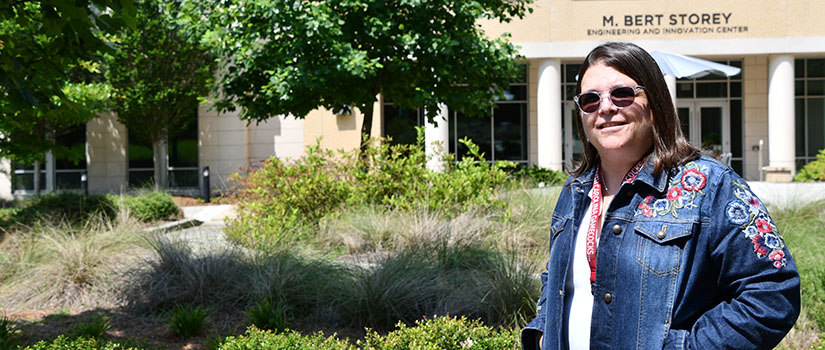A 2021 Harvard Business Review article discovered that curiosity, achieving impact in an area that excites them and connecting with others are some of the elements of lifelong learners. These characteristics apply to Integrated Information Technology (IIT) Ph.D. candidate Denise S. Davis and her passion for sharing her knowledge with students.
Denise’s multidisciplinary background in computing, medical physics and math positions her well for informatics research. She not only has the technical competence in current data science and analytics methods but also working with medical professionals in research at the frontiers of healthcare practice.
- IIT Department Chair Elizabeth Regan
Davis has an extensive educational and professional background, but her curiosity for learning has never diminished.
After graduating with her bachelor’s degree as a double major in math and physics and a master’s degree in medical physics, Davis relocated to Houston to work as a medical physicist and perform clinical research at the MD Anderson Cancer Center in Houston for seven years.
“It's one of those careers that happens very quickly. By the time I was 30, I had reached the pinnacle of my pathway,” Davis says.
Davis eventually moved to Atlanta, where she made a career change from medical physics to healthcare decision support and computer databases. According to Davis, the transition was easy since she had worked in radiation oncology and already had experience with databases because of her research activities. Medical physics is applying physics concepts and methods to diagnosing and treating diseases. Davis is certified in radiation therapy, but most treatments are driven by computers, data and complex analysis.
“Changing careers wasn’t a stretch for me because medical physics is algorithm-based with databases, hardware and software. I was able to make it a lateral move because the technology was still there, applied to a different healthcare subject. There are some specialties in different types of electronics, but the architecture is fundamentally the same,” Davis says.
For 13 years, Davis decided to be a stay-at-home parent for her four children. But her passion for learning never wavered. In 2018, she earned a second master’s degree in computer science from the University of South Carolina. Davis also began teaching courses in Structural Query Language and databases in the College of Engineering and Computing’s IIT Department. Part of her motivation for returning to school was a desire to teach at the university level and share her unique background to help students understand that information technology and computers are a tool rather than a barrier to their work.
“I don't teach the material esoterically - if you can teach database systems at a level that's not beyond the students’ interest, they'll be more engaged and successful,” Davis says. “I use real world examples and hands on activities to engage the students since they learn in different ways. I love teaching students and need that in my life."
In addition to teaching, Davis is pursuing her Ph.D. in health informatics, which she is on track to complete next year. It combines her passions and previous experiences because she had attempted to put parts of health informatics together in her previous work. Davis is currently working alongside IIT Department Chair Elizabeth Regan on complex data that must be broken down and rebuilt. Her thesis is improving clinical research cancer decision support tools related to decision support in oncology and clinical trials.
“I am never handed projects that are clearly defined, so I always have to learn something new. With one project, I had to learn how to use Epic, the electronic health records software that most hospitals use. I've gone through training at Prisma Health, and my major role is disseminating data,” Davis says.
Health informatics, which dates back to the 1950s, has some form of sensor data and aims to develop methods and technologies for acquiring and processing patient data. The goal is for medical offices to bring their charts online by being interoperable for a doctor’s office to know a patient’s personal information and health history in real time. An example of health informatics is preventing cancer patients from waiting for lab results to be uploaded to their chart with key information about their disease and important genetic information that can determine effective and ineffective treatments that are known for standards of care.
A complete electronic integration of patient care is still evolving. According to Davis, electronic patient data is collected through patient interactions and existing and established clinical workflows. But multidisciplinary coordination with key stakeholders is required for developing tools with most current technological advances in computing, such as artificial intelligence, that have the greatest impact on delivering efficient, accurate and quality care. Clinical and translational research are currently the main drivers toward that goal.
“I personally will be happy when patient care is integrated electronically to the level of our most intuitive database search engines that can return patient information as easy and complete as a Google search engine. We are not there yet since there are still components of daily patient care that are not seamless,” Davis says. “Health informatics is a specialized yet very wide range of field.”
Davis plans to continue teaching and perform oncology research after earning her Ph.D. next year. As a lifelong learner, Davis believes that new techniques for improving current processes are necessary since technology is always evolving. For example, Davis’s current students have always had computers in their life and may not understand the background of why databases exist or how the Internet has evolved.
“In the 2000s, I worked on projects when we just started bringing applications on the web,” Davis says. “There’s so much that has changed since then, and I enjoy sharing my personal experiences with them. I tell them that information technology evolved and wasn't always in a nice package. The digital world came together over time, and I am excited to learn about new advances in technology on our horizon.”
